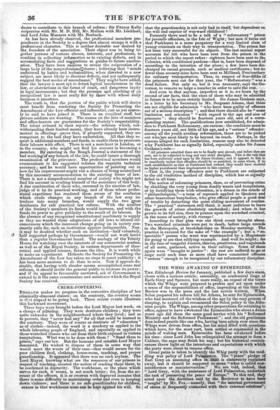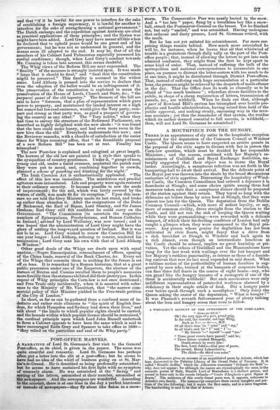THE WHIG AWAKING OF EPIMENIDES.
THE Edinburgh Review for January, published a few days since, closes with a curious article; ostensibly, an academical eloge of Earls Grey and Spencer, but more really, an expose of the views which the Whigs were prepared to profess and act upon under a sense of the responsibilities of office, impending at the time the Review was in the press and the last article written. When Solon prepared his reform bill for Athens, he sent for Epimenides, who had mastered all the wisdom of the age by the easy process of sleeping, to explain and recommend the Solon policy to the Athe- nian people. The Whigs, among other preparations for returning to office, appear to have awakened the Epimenides who about a dozen years ago did them the same good service with his " Reformed Ministry and the Reformed Parliament" : and the old gentleman does indeed prattle like one who, having been asleep ever since the Whigs were driven from office, has his mind filled with questions which have, for the most part, been settled or superseded in the minds of waking men. Epimenides has been awakened before his time : since Lord John has relinquished the attempt to form a Cabinet, the sage may finish his nap ; but his historical reminis- cences throw light on the intentions and expectations with which the party were about to resume office. Great pains is taken to identify the Whig party with the med- dling war policy of Lord Palmerston. The "peace" pledge of Earl Grey on assuming office in 1830 is elaborately explained away, lest it should be supposed to mean "what is called non- interference or nonintervention." We are told, indeed, that " Lord Grey, with the assistance of Lord Palmerston, undertook the task of preserving the peace of Europe." To this end, they acted upon the doctrines said by the Reviewer to have been "taught" by Mr. Fox,—namely, that "the internal government of states is frequently connected with their external relations"; and that "if it be lawful for one power to interfere for the sake of establishing a foreign supremacy, it is lawful for another to interfere for the sake of strengthening a national government." The Dutch embargo and the expedition against Antwerp are cited as practical applications of these principles ; and the Syrian war might have been added. Lord Grey may have meant all this when he declared that to uphold peace would be one great end of his government ; but he was not so understood in general, and the means seem ill adapted to the end. It may be, that of all the members of his Cabinet Lord Palmerston especially possessed his cordial confidence; though, when Lord Grey's conduct towards Mr. Canning is taken into account, this seems doubtful. The Whig views of the Reform Bill are next expounded. The "finality ' of the measure is strongly insisted upon. It was made " large that it should be final," and "final that the constitution might be preserved." This finality is assumed in the widest sense. Lord Althorp is pressed into the service to declare that even the adoption of the ballot would be an infringement of it. The preservation of the constitution is explained to mean the preservation of the House of Lords, Church and State, &c., " the purpurei panni of the old tapestry." The framers of the bill are said to have "foreseen, that a plan of representation which gave power to property, and maintained the landed interest on a high but somewhat lowered eminence, would give the Tory party, com- pact and strong as that party was, as good a prospect of govern- ing the country as any other." The "Tory nobles," when they had time to survey the structure of the Reformed Parliament, are described as highly delighted with the new abode : "it was found that the bees could make honey, and had even more room in the new hive than the old." Everybody understands this now ; and the Reviewer remarks, with a chuckle of satisfaction at the easier times for Whigs resuming office, that "the formidable proposal of a new Reform Bill" has been set at rest. Finality has triumphed !
The new Poor-law is explained and eulogized at great length. The horrors of the old law are painted in a style that speaks to the sympathies of country gentlemen. Under it, " gangs of men, young and old, under a timid overseer, neglected the parish road they were put to mend, and, combining together in crowds, planned a scheme of poaching and drinking for the night." The Irish Coercion Act is enthusiastically applauded. "The effect of this law was immediate. The murderous and prvedial agitators were intimidated. Life and property were again restored to their ordinary security. It became possible to sow the seeds of improvement ; for the soil, which was lately covered by the waters of strife, was made fit for its reception.' Upon this mea- sure we are told the Grey Ministry made its last stand, and broke up rather than abandon it. After the resignations of the Duke of Richmond, the Earl of Ripon, Lord Stanley, and Sir James Graham, Earl Grey still felt confident he could carry on the Government. "The Commission [to ascertain the respective numbers of Episcopalians, Presbyterians, and Roman Catholics in Ireland,] advised by Lord Wellesley, was now issued ; and it was hoped that the administration of Lord Grey might have the glory of settling the long-vexed question of Ireland. But it was not to be so. Lord Grey wished to renew the Coercion Bill for one year longer : Lord Althorp, refusing to concur, tendered his resignation ; Lord Grey sent his own with that of Lord Althorp to Windsor."
Other good deeds of the Whigs are dwelt upon with equal unction,—Negro Emancipation, retrenchment of offices, opening of the China trade, renewal of the Bank Charter, &c. Every act of the Whigs that commits them to nothing for the future is set off en beau. It is remarked by a Roman historian, that at a great public procession under one of the Emperors, the absence of the statues of Brutus and Cassius recalled them to people's memories more forcibly than the statues exhibited did their prototypes. In this expose of Whig principles the Corn-law is not once mentioned ; and Free Trade only incidentally, when it is asserted with refer- ence to the Ministry of Mr. Vansittart, that "the narrow com- mercial policy of that Minister yielded to the Free-trade petition of the City of London." In short, as far as can be gathered from a confused mass of in- definite and rather stale allusions to "the spirit of English free- dom, for which Hampden and Sydney laid down their lives," and talk about "the limits to which popular rights should be carried, and the bounds within which popular licence should be restrained," the cardinal principle upon which Lord John Russell undertook to form a Cabinet appears to have been the same which is said to have encouraged Earls Grey and Spencer to take office in 1830— " they relied on the patriotism and zeal of the Whig party."



























 Previous page
Previous page